Module11 Body language Unit1 They touch noses! 同步测试卷(含解析)
文档属性
| 名称 | Module11 Body language Unit1 They touch noses! 同步测试卷(含解析) |
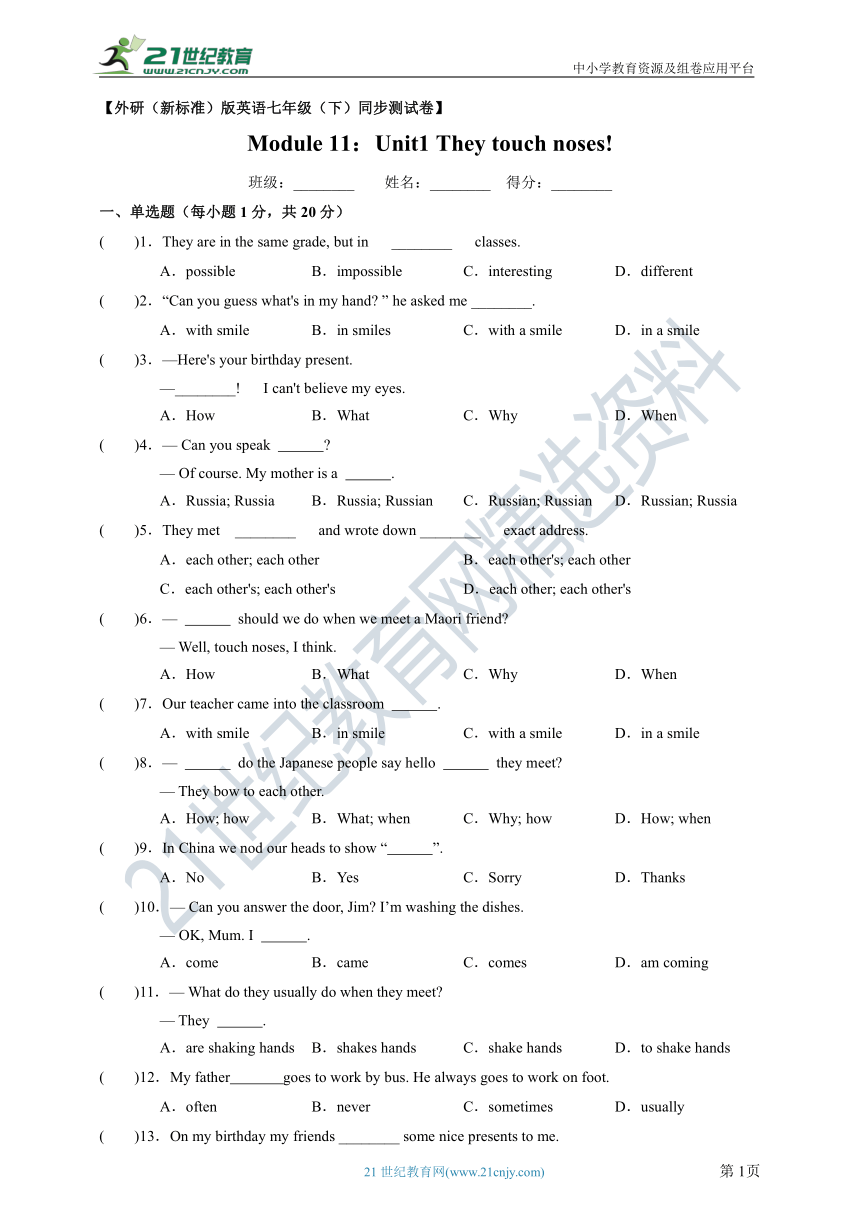
|
|
| 格式 | zip | ||
| 文件大小 | 917.1KB | ||
| 资源类型 | 试卷 | ||
| 版本资源 | 外研版 | ||
| 科目 | 英语 | ||
| 更新时间 | 2020-06-03 00:00:00 | ||
图片预览

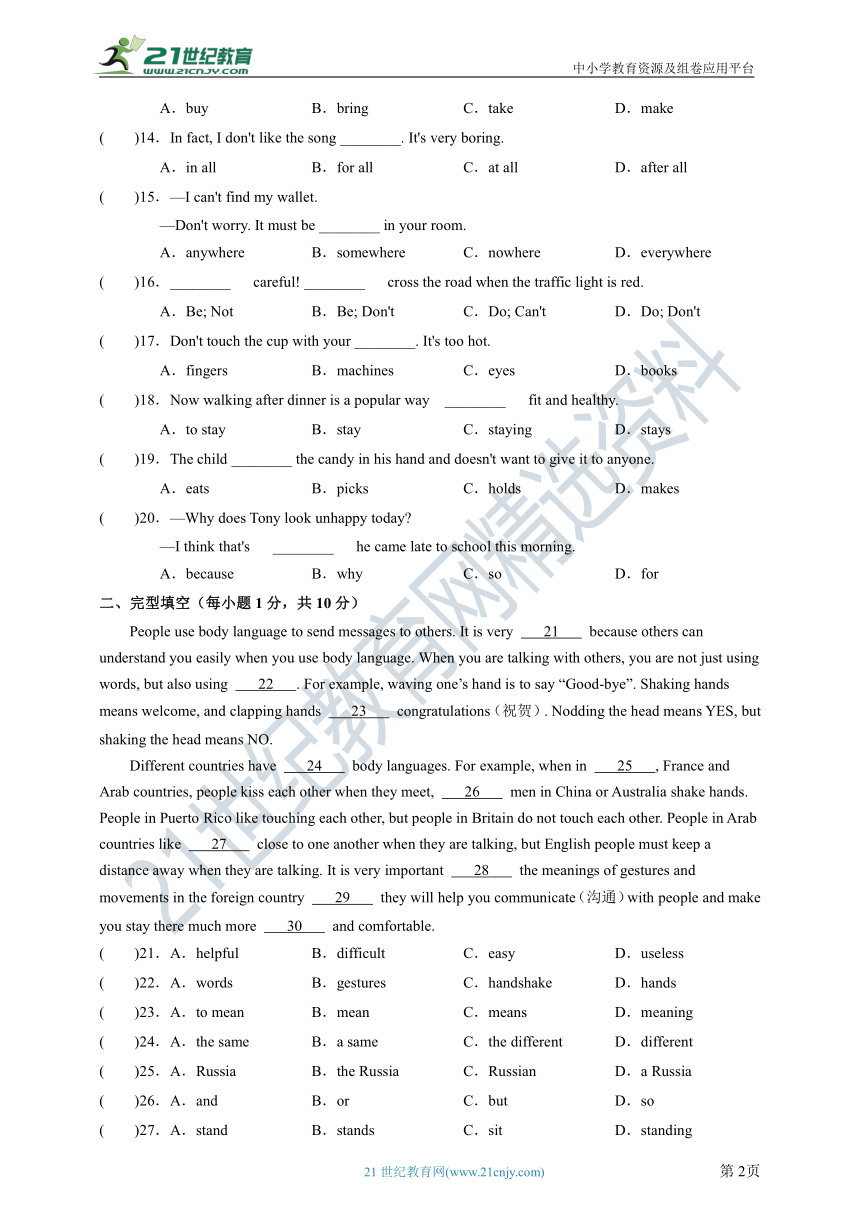
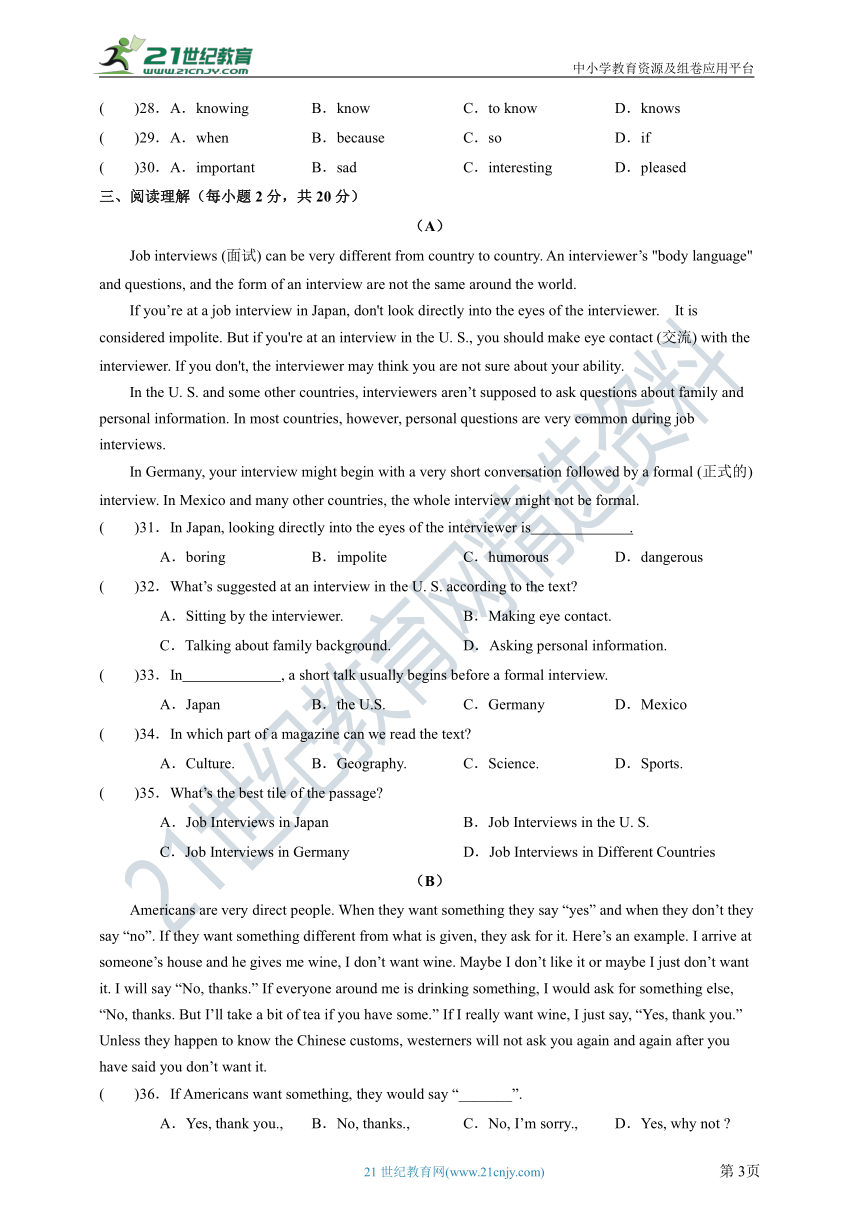
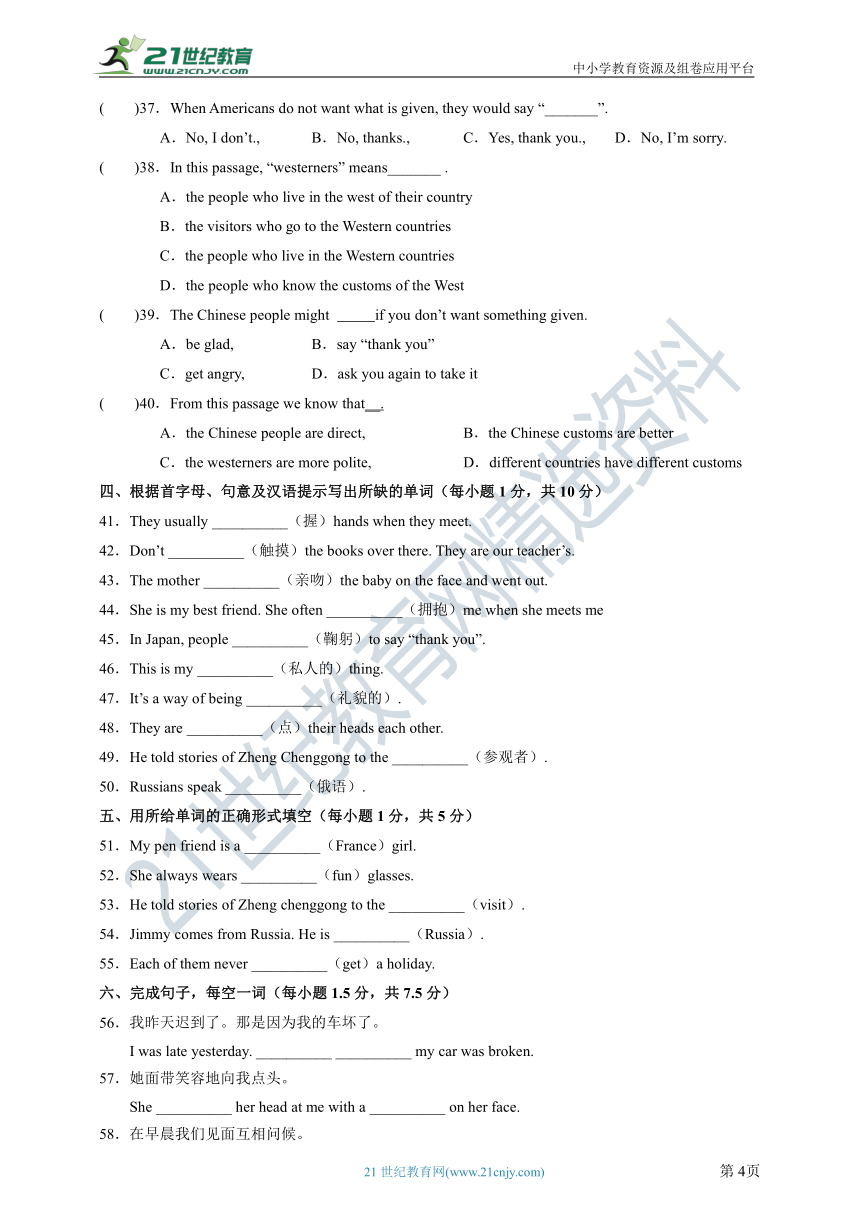
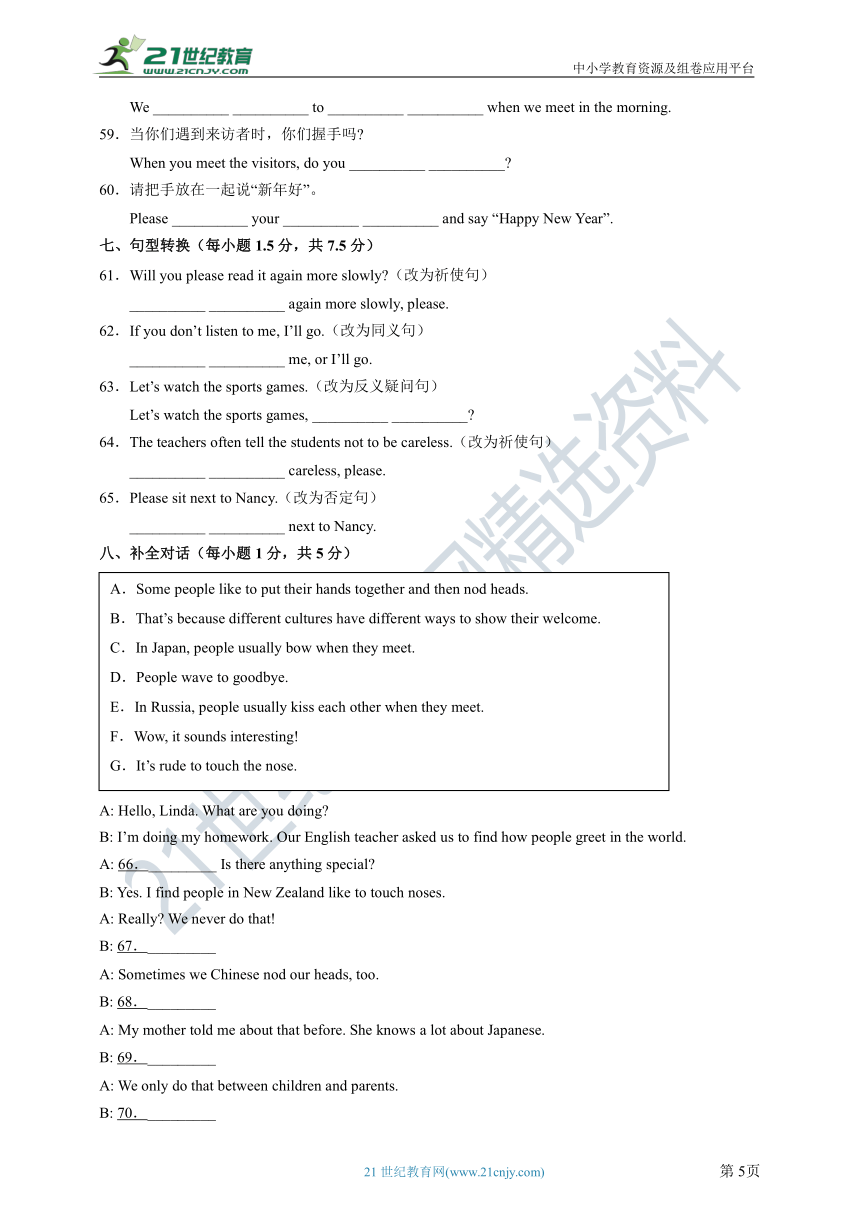
文档简介
中小学教育资源及组卷应用平台
【外研(新标准)版英语七年级(下)同步测试卷】
Module
11:Unit1
They
touch
noses!
班级:________
姓名:________
得分:________
一、单选题(每小题1分,共20分)
(
)1.They
are
in
the
same
grade,
but
in
________
classes.
A.possible
B.impossible
C.interesting
D.different
(
)2.“Can
you
guess
what's
in
my
hand?
”
he
asked
me
________.
A.with
smile
B.in
smiles
C.with
a
smile
D.in
a
smile
(
)3.—Here's
your
birthday
present.
—________!
I
can't
believe
my
eyes.
A.How
B.What
C.Why
D.When
(
)4.—
Can
you
speak
?
—
Of
course.
My
mother
is
a
.
A.Russia;
Russia
B.Russia;
Russian
C.Russian;
Russian
D.Russian;
Russia
(
)5.They
met
________
and
wrote
down
________
exact
address.
A.each
other;
each
other
B.each
other's;
each
other
C.each
other's;
each
other's
D.each
other;
each
other's
(
)6.—
should
we
do
when
we
meet
a
Maori
friend?
—
Well,
touch
noses,
I
think.
A.How
B.What
C.Why
D.When
(
)7.Our
teacher
came
into
the
classroom
.
A.with
smile
B.in
smile
C.with
a
smile
D.in
a
smile
(
)8.—
do
the
Japanese
people
say
hello
they
meet?
—
They
bow
to
each
other.
A.How;
how
B.What;
when
C.Why;
how
D.How;
when
(
)9.In
China
we
nod
our
heads
to
show
“
”.
A.No
B.Yes
C.Sorry
D.Thanks
(
)10.—
Can
you
answer
the
door,
Jim?
I’m
washing
the
dishes.
—
OK,
Mum.
I
.
A.come
B.came
C.comes
D.am
coming
(
)11.—
What
do
they
usually
do
when
they
meet?
—
They
.
A.are
shaking
hands
B.shakes
hands
C.shake
hands
D.to
shake
hands
(
)12.My
father
goes
to
work
by
bus.
He
always
goes
to
work
on
foot.
A.often
B.never
C.sometimes
D.usually
(
)13.On
my
birthday
my
friends
________
some
nice
presents
to
me.
A.buy
B.bring
C.take
D.make
(
)14.In
fact,
I
don't
like
the
song
________.
It's
very
boring.
A.in
all
B.for
all
C.at
all
D.after
all
(
)15.—I
can't
find
my
wallet.
—Don't
worry.
It
must
be
________
in
your
room.
A.anywhere
B.somewhere
C.nowhere
D.everywhere
(
)16.________
careful!
________
cross
the
road
when
the
traffic
light
is
red.
A.Be;
Not
B.Be;
Don't
C.Do;
Can't
D.Do;
Don't
(
)17.Don't
touch
the
cup
with
your
________.
It's
too
hot.
A.fingers
B.machines
C.eyes
D.books
(
)18.Now
walking
after
dinner
is
a
popular
way
________
fit
and
healthy.
A.to
stay
B.stay
C.staying
D.stays
(
)19.The
child
________
the
candy
in
his
hand
and
doesn't
want
to
give
it
to
anyone.
A.eats
B.picks
C.holds
D.makes
(
)20.—Why
does
Tony
look
unhappy
today?
—I
think
that's
________
he
came
late
to
school
this
morning.
A.because
B.why
C.so
D.for
二、完型填空(每小题1分,共10分)
People
use
body
language
to
send
messages
to
others.
It
is
very
21
because
others
can
understand
you
easily
when
you
use
body
language.
When
you
are
talking
with
others,
you
are
not
just
using
words,
but
also
using
22
.
For
example,
waving
one’s
hand
is
to
say
“Good-bye”.
Shaking
hands
means
welcome,
and
clapping
hands
23
congratulations(祝贺).
Nodding
the
head
means
YES,
but
shaking
the
head
means
NO.
Different
countries
have
24
body
languages.
For
example,
when
in
25
,
France
and
Arab
countries,
people
kiss
each
other
when
they
meet,
26
men
in
China
or
Australia
shake
hands.
People
in
Puerto
Rico
like
touching
each
other,
but
people
in
Britain
do
not
touch
each
other.
People
in
Arab
countries
like
27
close
to
one
another
when
they
are
talking,
but
English
people
must
keep
a
distance
away
when
they
are
talking.
It
is
very
important
28
the
meanings
of
gestures
and
movements
in
the
foreign
country
29
they
will
help
you
communicate(沟通)with
people
and
make
you
stay
there
much
more
30
and
comfortable.
(
)21.A.helpful
B.difficult
C.easy
D.useless
(
)22.A.words
B.gestures
C.handshake
D.hands
(
)23.A.to
mean
B.mean
C.means
D.meaning
(
)24.A.the
same
B.a
same
C.the
different
D.different
(
)25.A.Russia
B.the
Russia
C.Russian
D.a
Russia
(
)26.A.and
B.or
C.but
D.so
(
)27.A.stand
B.stands
C.sit
D.standing
(
)28.A.knowing
B.know
C.to
know
D.knows
(
)29.A.when
B.because
C.so
D.if
(
)30.A.important
B.sad
C.interesting
D.pleased
三、阅读理解(每小题2分,共20分)
(A)
Job
interviews
(面试)
can
be
very
different
from
country
to
country.
An
interviewer’s
"body
language"
and
questions,
and
the
form
of
an
interview
are
not
the
same
around
the
world.
If
you’re
at
a
job
interview
in
Japan,
don't
look
directly
into
the
eyes
of
the
interviewer.
It
is
considered
impolite.
But
if
you're
at
an
interview
in
the
U.
S.,
you
should
make
eye
contact
(交流)
with
the
interviewer.
If
you
don't,
the
interviewer
may
think
you
are
not
sure
about
your
ability.
In
the
U.
S.
and
some
other
countries,
interviewers
aren’t
supposed
to
ask
questions
about
family
and
personal
information.
In
most
countries,
however,
personal
questions
are
very
common
during
job
interviews.
In
Germany,
your
interview
might
begin
with
a
very
short
conversation
followed
by
a
formal
(正式的)
interview.
In
Mexico
and
many
other
countries,
the
whole
interview
might
not
be
formal.
(
)31.In
Japan,
looking
directly
into
the
eyes
of
the
interviewer
is
.
A.boring
B.impolite
C.humorous
D.dangerous
(
)32.What’s
suggested
at
an
interview
in
the
U.
S.
according
to
the
text?
A.Sitting
by
the
interviewer.
B.Making
eye
contact.
C.Talking
about
family
background.
D.Asking
personal
information.
(
)33.In
,
a
short
talk
usually
begins
before
a
formal
interview.
A.Japan
B.the
U.S.
C.Germany
D.Mexico
(
)34.In
which
part
of
a
magazine
can
we
read
the
text?
A.Culture.
B.Geography.
C.Science.
D.Sports.
(
)35.What’s
the
best
tile
of
the
passage?
A.Job
Interviews
in
Japan
B.Job
Interviews
in
the
U.
S.
C.Job
Interviews
in
Germany
D.Job
Interviews
in
Different
Countries
(B)
Americans
are
very
direct
people.
When
they
want
something
they
say
“yes”
and
when
they
don’t
they
say
“no”.
If
they
want
something
different
from
what
is
given,
they
ask
for
it.
Here’s
an
example.
I
arrive
at
someone’s
house
and
he
gives
me
wine,
I
don’t
want
wine.
Maybe
I
don’t
like
it
or
maybe
I
just
don’t
want
it.
I
will
say
“No,
thanks.”
If
everyone
around
me
is
drinking
something,
I
would
ask
for
something
else,
“No,
thanks.
But
I’ll
take
a
bit
of
tea
if
you
have
some.”
If
I
really
want
wine,
I
just
say,
“Yes,
thank
you.”
Unless
they
happen
to
know
the
Chinese
customs,
westerners
will
not
ask
you
again
and
again
after
you
have
said
you
don’t
want
it.
(
)36.If
Americans
want
something,
they
would
say
“_______”.
A.Yes,
thank
you.,
B.No,
thanks.,
C.No,
I’m
sorry.,
D.Yes,
why
not
?
(
)37.When
Americans
do
not
want
what
is
given,
they
would
say
“_______”.
A.No,
I
don’t.,
B.No,
thanks.,
C.Yes,
thank
you.,
D.No,
I’m
sorry.
(
)38.In
this
passage,
“westerners”
means_______
.
A.the
people
who
live
in
the
west
of
their
country
B.the
visitors
who
go
to
the
Western
countries
C.the
people
who
live
in
the
Western
countries
D.the
people
who
know
the
customs
of
the
West
(
)39.The
Chinese
people
might
if
you
don’t
want
something
given.
A.be
glad,
B.say
“thank
you”
C.get
angry,
D.ask
you
again
to
take
it
(
)40.From
this
passage
we
know
that__.
A.the
Chinese
people
are
direct,
B.the
Chinese
customs
are
better
C.the
westerners
are
more
polite,
D.different
countries
have
different
customs
四、根据首字母、句意及汉语提示写出所缺的单词(每小题1分,共10分)
41.They
usually
__________(握)hands
when
they
meet.
42.Don’t
__________(触摸)the
books
over
there.
They
are
our
teacher’s.
43.The
mother
__________(亲吻)the
baby
on
the
face
and
went
out.
44.She
is
my
best
friend.
She
often
__________(拥抱)me
when
she
meets
me
45.In
Japan,
people
__________(鞠躬)to
say
“thank
you”.
46.This
is
my
__________(私人的)thing.
47.It’s
a
way
of
being
__________(礼貌的).
48.They
are
__________(点)their
heads
each
other.
49.He
told
stories
of
Zheng
Chenggong
to
the
__________(参观者).
50.Russians
speak
__________(俄语).
五、用所给单词的正确形式填空(每小题1分,共5分)
51.My
pen
friend
is
a
__________(France)girl.
52.She
always
wears
__________(fun)glasses.
53.He
told
stories
of
Zheng
chenggong
to
the
__________(visit).
54.Jimmy
comes
from
Russia.
He
is
__________(Russia).
55.Each
of
them
never
__________(get)a
holiday.
六、完成句子,每空一词(每小题1.5分,共7.5分)
56.我昨天迟到了。那是因为我的车坏了。
I
was
late
yesterday.
__________
__________
my
car
was
broken.
57.她面带笑容地向我点头。
She
__________
her
head
at
me
with
a
__________
on
her
face.
58.在早晨我们见面互相问候。
We
__________
__________
to
__________
__________
when
we
meet
in
the
morning.
59.当你们遇到来访者时,你们握手吗?
When
you
meet
the
visitors,
do
you
__________
__________?
60.请把手放在一起说“新年好”。
Please
__________
your
__________
__________
and
say
“Happy
New
Year”.
七、句型转换(每小题1.5分,共7.5分)
61.Will
you
please
read
it
again
more
slowly?(改为祈使句)
__________
__________
again
more
slowly,
please.
62.If
you
don’t
listen
to
me,
I’ll
go.(改为同义句)
__________
__________
me,
or
I’ll
go.
63.Let’s
watch
the
sports
games.(改为反义疑问句)
Let’s
watch
the
sports
games,
__________
__________?
64.The
teachers
often
tell
the
students
not
to
be
careless.(改为祈使句)
__________
__________
careless,
please.
65.Please
sit
next
to
Nancy.(改为否定句)
__________
__________
next
to
Nancy.
八、补全对话(每小题1分,共5分)
A:
Hello,
Linda.
What
are
you
doing?
B:
I’m
doing
my
homework.
Our
English
teacher
asked
us
to
find
how
people
greet
in
the
world.
A:
66._________
Is
there
anything
special?
B:
Yes.
I
find
people
in
New
Zealand
like
to
touch
noses.
A:
Really?
We
never
do
that!
B:
67._________
A:
Sometimes
we
Chinese
nod
our
heads,
too.
B:
68._________
A:
My
mother
told
me
about
that
before.
She
knows
a
lot
about
Japanese.
B:
69._________
A:
We
only
do
that
between
children
and
parents.
B:
70._________
九、书面表达(共15分)
71.假如你是李华,给你的笔友Tom写封信,告诉他一些中国的礼仪。要求:
(1)要点包括餐桌礼仪,文明习惯等,可适当拓展;
(2)词数80左右。
_______________________________________________________________________________________
_______________________________________________________________________________________
_______________________________________________________________________________________
_______________________________________________________________________________________
_______________________________________________________________________________________
_______________________________________________________________________________________
_______________________________________________________________________________________
参考答案
1.D
【解析】句意:他们在同一年级,但在不同的班。
考查形容词辨析,possible可能的;impossible不可能的;interesting有趣的;different不同的。分析句意,并结合but,,可知后半句表示他们在不同的班。第二空后面是名词复数,用形容词different作定语修饰后面的名词。故选D。
2.C
【解析】句意:他面带微笑的问我:“猜到我手里拿着什么吗?”
考查介词短语,smile微笑,可数名词,一般用的是with
a
smile表示面带微笑。分析句意,此处表述的是他面带微笑的问我。故选C。
3.B
【解析】句意:——这是你的生日礼物。
——什么!
我不敢相信我的眼睛。
考查情景交际用语,How怎样(通常询问方式);What什么;why为什么(询问原因);When什么时候(询问时间)。根据“I
can't
believe
my
eyes.”可知自己很是吃惊,用what!什么!表示惊讶,符合场景,且意思完整。故选B。
4.C
【解析】句意:——你会说俄语吗?——当然会了。我妈妈就是俄罗斯人。
考查名词的用法辨析。Russia意为“俄罗斯”,指国家;Russian可用作名词,意为“俄语;俄罗斯人”。根据句意故选C。
5.D
【解析】句意:他们遇到了彼此,写下了彼此确切的地址。
each
other彼此;each
other’s彼此的。分析句意,第一个空表示“彼此”。用each
other。第二个空表示“彼此的”用所有格形式,表示后面的exact
address隶属于他们。所以第二个空填each
other's。故选D。
6.B
【解析】句意:——当我们遇到毛利朋友的时候我们做什么?——我认为是碰鼻子。
考查疑问词做宾语。根据句意可知,当我们遇到毛利朋友的时候我们做什么?用疑问词what作do的宾语,意为“做什么”。故选B。
7.C
【解析】句意:我们老师面带微笑走进教室。
固定短语:with
a
smile意为“微笑地”。with表伴随,故选C。
8.D
【解析】句意:——当日本人见面时他们怎么打招呼?——他们互相鞠躬。
考查特殊疑问词的用法和连词的用法。how意为“怎样;怎么”,用来询问方式;连词when意为“当……时候”。What意为“什么”,Why意为“为什么”。根据句意及下句提示。可知问当日本人见面时怎么打招呼?故答案为D。
9.B
【解析】句意:在中国,我们点头表示同意。
考查情景交际。A.
No不;B.
Yes是的;C.
Sorry对不起;D.
Thanks谢谢。根据常识可知,在中国点头代表着“同意”。故选B。
10.D
【解析】句意:——吉姆,你能去开一下门吗?我正在洗碗。——好的,妈妈。我这就来。
考查动词的时态。A.
come一般现在时;B.
came一般过去时;
C.
comes一般现在时;D.
am
coming现在进行时。根据语境可知这里用现在进行时表示将来。故选D。
11.C
【解析】句意:——他们见面的时候经常做些什么?——他们握手。
考查动词时态。问句和答语时态要一致。问句中usually表示习惯性,经常性的动作。时态为一般现在时。故答句中时态也用一般现在时,答语中主语为they,所以句中的动词用动词原形。动词短语shake
hands意为“握手”。故答案为C。
12.B
【解析】句意:我爸爸从不坐公交上班。他总是步行去上班。A.
often经常;B.
never从不;C.
sometimes有时;D.
usually通常。因为总是步行,所以从不坐公交。故选B。
13.B
【解析】句意:在我生日那天,我的朋友们给我带了一些漂亮的礼物。
考查动词辨析。buy买,原形;
bring带来,原形;take带去;make使,制作。短语bring
sth.
to
sb.把某物带给某人,这里是在我生日时,我朋友们给我带礼物。根据题意,故选B。
14.C
【解析】句意:事实上,我一点也不喜欢这首歌。很无聊。
考查介词短语。in
all总计;
for
all虽然;尽管;at
all全然;一点;after
all毕竟。根据下文“It's
very
boring.”可知上文是说我一定也不喜欢这首歌。not…at
all一点也不。根据题意,故选C。
15.B
【解析】句意:——我找不到我的钱包了。——不要担心。它一定在你房间的某个地方。
考查不定代词。anywhere任何地方;somewhere某个地方;nowhere无处;哪里都不;everywhere到处,处处。这里是说它一定在房间的某地地方。根据题意,故选B。
16.B
【解析】句意:小心!当交通灯变红时不要过马路。
考查祈使句的否定及be动词,祈使句,动词原形开头,careful形容词,和be连用。Be
careful小心,排除CD;第二空是否定祈使句,其结构是Don’t+动词原形,Don't
cross
the
road不要穿过马路。根据题意,故选B。
17.A
【解析】句意:别用手指碰杯子。太热了。
考查名词辨析。fingers手指;machines机器;eyes眼睛;books书。根据下文“It's
too
hot.”可知,这里是说不要用手碰杯子,太烫了。根据题意,故选A。
18.A
【解析】句意:现在饭后散步是保持健康的一种流行方式。
考查非谓语动词。to
stay保持,动词不定式;stay保持,原形;staying保持,现在分词;stays保持,第三人称单数。这里是动词不定式做后置定语修饰“a
popular
way”短语keep
fit
and
healthy保持健康。这里是保持健康的一种方式。根据题意,故选A。
19.C
【解析】句意:孩子手里拿着糖果,不想把它给任何人。
考查动词辨析。eats吃,第三人称单数;
picks采摘;holds拿,握;makes使,制作。根据下文“doesn't
want
to
give
it
to
anyone.”可知上文是他手里拿着糖。根据题意,故选C。
20.A
【解析】句意:——为什么托尼今天看起来不高兴?——我想那是因为他今天早上上学迟到了。
考查连词辨析。because因为;
why为什么;so因此;for为了。根据下文“Why
does
Tony
look
unhappy
today?
”可知,下文是回答原因,这里用because引导。根据题意,故选A。
21.A
22.B
23.C
24.D
25.A
26.C
27.D
28.C
29.B
30.D
【解析】本文讲述了不同国家有不同的肢体语言。在外国知道手势和动作的含义是很重要的,因为它们帮助你进行交流并且让你更加快乐、更加舒服地待在那里。
21.句意:它是非常有帮助的,因为当你使用肢体语言时,其他人会轻松地明白你。
A.
helpful有帮助的,B.
difficult
困难的,C.
easy容易的,D.
useless无用的。根据because
others
can
understand
you
easily
when
you
use
body
language.可知,使用肢体语言可以让别人轻松明白你的话,所以它是有帮助的。故选A。
22.句意:当你和别人说话时,不仅使用语言,还会用到手势。
A.
words
单词,B.
gestures
姿势,C.
handshake握手,D.
hands手。根据后文的For
example,
waving
one’s
hand
is
to
say
“Good-bye”.可知,挥手说再见,故这是手势,故选B。
23.句意:握手意味着欢迎,鼓掌意味着祝贺。
A.
to
mean意味着,是动词不定式;B.
mean
意味着,是复数形式;C.
means
意味着,是第三人称单数形式;D.
meaning意味着,是动名词;此处动名词短语clapping
hands作主语,故谓语用第三人称单数形式,故选C。
24.句意:不同国家有不同的肢体语言。
A.
the
same同样的,B.
a
same同样的,
C.
the
different不同的东西,D.
different不同的。由下文可知,不同的国家有不同的肢体语言。根据后文的For
example,
when
in
___5___,
France
and
Arab
countries,
people
kiss
each
other
when
they
meet,
___6___
men
in
China
or
Australia
shake
hands.可知,不同的国家有不同的手势,different意为“不同的”,且前面不加定冠词the。故选D。
25.句意:例如,在俄国,法国和阿拉伯国家,人们见面是互相亲吻,但是在中国或者澳大利亚的男人握手。
A.
Russia
俄国,B.
the
Russia那个俄国,C.
Russian
俄国人,D.
a
Russia一个俄国。此处需要选择表示“国家”的词,且专有名词前不加冠词。故选A。
26.句意:例如,在俄国,法国和阿拉伯国家,人们见面是互相亲吻,但是在中国或者澳大利亚的男人握手。
A.
and而且,B.
or
或者,C.
but
但是,D.
so所以。前后两个分句的意思是相反的,所以选择表示转折的并列连词。故选C。
27.句意:阿拉伯国家的人喜欢说话时彼此站得非常近,但是人在说话时应该保持一定距离。
A.
stand
站立,是复数形式;B.
stands站立,是第三人称单数形式;C.
sit坐,是复数形式;D.
standing站立,是现在分词。like后面接动词-ing形式。故选D。
28.句意:在外国知道手势和动作的含义是很重要的,因为它们帮助你进行交流并且让你更加快乐、更加舒服地待在那里。
A.
knowing
知道,是现在分词;B.
know知道,是复数形式;C.
to
know知道,是动词不定式;D.
knows知道,是第三人称单数形式。It’s+形容词+to
do
sth.“做某事是……”it是形式主语,to
do
sth是真正主语。故选C。
29.句意:在外国知道手势和动作的含义是很重要的,因为它们帮助你进行交流并且让你更加快乐、更加舒服地待在那里。
A.
when
当……时候;B.
because因为;C.
so
所以;D.
if如果。结合句意,前后两句之间是因果关系,后半句表示原因。故选B。
30.句意:在外国知道手势和动作的含义是很重要的,因为它们帮助你进行交流并且让你更加快乐、更加舒服地待在那里。
A.
important
重要的,B.
sad悲伤的,C.
interesting有趣的,D.
pleased高兴的。根据语境可知,知道外国的手势和动作的含义,这样住在那里会更高兴,故选D。
31.B
32.B
33.C
34.A
35.D
【解析】各个国家面试方式各不相同。在日本接受工作面试,不要直视面试官的眼睛,这被认为是不礼貌的;在美国面试,应该和面试官进行眼神交流;在美国和其他一些国家,面试官不应该询问关于家庭和个人信息的问题。在德国,面试可能从一个非常简短的谈话开始。
31.细节理解题。根据第二段中的句子“If
you’re
at
a
job
interview
in
Japan,
don't
look
directly
into
the
eyes
of
the
interviewer.
It
is
considered
impolite.”可知,在日本接受工作面试,不要直视面试官的眼睛,这被认为是不礼貌的。故答案为B。
32.细节理解题。根据第二段中的句子“But
if
you're
at
an
interview
in
the
U.
S.,
you
should
make
eye
contact
(交流)
with
the
interviewer.”可知,如果你在美国面试,你应该和面试官进行眼神交流。故答案为B。
33.细节理解题。根据最后一段中的句子“In
Germany,
your
interview
might
begin
with
a
very
short
conversation
followed
by
a
formal
(正式的)
interview.”可知,在德国,正式面试前通常进行简短的谈话。故答案为C。
34.推理判断题。我们能在杂志的哪一部分读到这篇文章?A.
Culture.文化;B.
Geography.地理;C.
Science.科学;D.
Sports.体育。短文介绍的是各个国家在面试时有不同的方式,说明每个国家都有不同的文化习俗,本文属于文化类短文阅读,故答案为A。
35.标题归纳题。不同国家有不同的面试方式,短文分别列举了日本、美国和德国三个国家来加以说明,故答案为D。
36.A
37.B
38.C
39.D
40.D
【解析】这篇短文主要以一个例子讲述了美国人很直接。他们如果不想要什么东西,会直接拒绝;想要的话会接受,对于自己喜欢的东西也会提出要求,这和中国人是不一样的。
36.细节理解题。文章第一段When
they
want
something,
they
say“Yes”如果他们想要什么东西,他们会说“好的”,故选A“好的,谢谢”。
37.细节理解题。文章描述Maybe
I
don’t
like
it
or
maybe
I
just
don’t
want
it.
I
will
say
“No
thanks”如果我不喜欢或是不想要,我会说“不,谢谢”,故选B。
38.词意猜测题。Westerns西方人,选C,指住在西方国家的人。
39.判断推理题。根据文中最后一句Unless
they
happen
know
the
Chinese
customs(风俗;习惯),westernerswill
not
ask
you
again
and
again
after
you
to
eat
or
drink
something.除非是知道中国人的风俗,西方人是不会一遍又一遍的要不吃点或喝点东西。由此判断D正确。
40.判断推理题。根据文中最后一句Unless
they
happen
know
the
Chinese
customs(风俗;习惯),westernerswill
not
ask
you
again
and
again
after
you
to
eat
or
drink
something.除非是知道中国人的风俗,西方人是不会一遍又一遍的要不吃点或喝点东西。可知中西方文化有差异,故选D。
41.shake
42.touch
43.kissed
44.hugs
45.bow
46.personal
47.polite
48.nodding
49.visitors
50.Russian
【解析】
41.句意:他们见面时通常握手。
根据句意及汉语提示。应填shake。shake
hands握手。主语为they,谓语动词用原形。故答案为:shake。
42.句意:别碰那边的书,它们是我老师的。
根据句意及汉语提示。应填touch。本题为祈使句。祈使句后用动词原形。故答案为:touch。
43.句意:母亲吻了吻婴儿的脸然后出去了。
根据句意及汉语提示。应填:kissed。and后动词went为一般过去时,and前后时态应一致,故kiss也用一般过去时。故答案为:kissed。
44.句意:她是我最好的朋友。她见到我时经常拥抱我。
根据句意及汉语提示。应填:hugs。主语为she,谓语动词需用第三人称单数,根据句意及题干中的“often”可知时态应为一般现在时,故答案为:hugs。
45.句意:在日本,人们鞠躬说“谢谢”。
根据句意及汉语提示。应填:bow。根据句意及主语为people,谓语动词应用复数形式。在日本,人们鞠躬说“谢谢”这是一种礼仪习惯,是一种通常性、习惯性的动作。故用一般现在时。故答案为:bow。
46.句意:这是我私人的东西。
根据句意及汉语提示。应填:personal。这里用形容词作定语,修饰名词thing。故答案为:personal。
47.句意:这是一种礼貌的方式。
根据句意及汉语提示。应填:polite。be动词后用形容词,构成系表结构。故答案为:polite。
48.句意:他们互相点头。
根据句意及汉语提示。应填:nodding。空前有be动词are。用现在进行时表示正在发生的动作。故答案为:nodding。
49.句意:他向参观者讲述郑成功的故事。
根据句意及汉语提示。应填:visitors。根据常识,一般参观者都是成群结队的,不是单独一个,故用名词的复数形式。故答案为:visitors。
50.句意:俄罗斯人讲俄语。
根据句意及汉语提示。应填:Russian。speak后面跟宾语做及物动词时,宾语一般是某种语言。俄语的单词为“Russian”,表示某种语言的单词的首字母要大写。故答案为:Russian。
51.French
52.funny
53.visitors
54.Russian
55.gets
【解析】
51.句意:我的笔友是一个法国女孩。
考查形容词作定语。修饰名词girl。根据括号里提示词“France法国”可联想形容词“French”;French
girl法国女孩。故答案为:French。
52.句意:她总是戴着有趣的眼镜。
考查形容词作定语。修饰名词glasses。根据括号里提示词“fun乐趣”可联想到形容词“funny有趣的”。funny是fun的形容词形式。故答案为:funny。
53.句意:他对游客们讲了郑成功的故事。
考查名词。“visit”动词,表示“游览”的意思;“visitor”名词,表示“游客”。因泛指游客。根据常识,游客不止一个人。应用复数形式。故答案为:visitors。
54.句意:吉米来自俄罗斯,他是俄罗斯人。
考查名词。根据句意及括号里单词的提示,可知,此处为俄罗斯人。Russia表示“俄罗斯”,国家名;Russian表示“俄罗斯人”。表示某种语言的单词的首字母要大写。故答案为:Russian。
55.句意:他们中每个人都从未度过假。
考查动词第三人称单数。“get
a
holiday”表示“度假”,根据题干中的“never”可知句子是一般现在时态。主语each是第三人称单数,谓语动词get也应用第三人称单数形式。故答案为:gets。
56.That’s
because
57.nodded/nods
smile
58.say
hello
each
other
59.shake
hands
60.put
hands
together
【解析】
56.首先通过中英文句子的比对,可知英文句子中缺少“那是因为”的表达。“那是因为”的英文表达是:That’s
because。本题中,根据前面的句号可知,that首字母应大写。故答案为:(1).
That’s
(2).
because。
57.首先通过中英文句子的比对,可知英文句子中缺少“点头”及“面带微笑”的表达。“点头”的英文表达是:“nod
one’s
head”。主语为she谓语动词应用第三人称单数,或者一般过去时。故用“nodded/nods”。短语“面带微笑”的英文表达是“smile
on
one’s
face”。故答案为:(1).
nodded/nods
(2).
smile。
58.首先通过中英文句子的比对,可知英文句子中缺少“互相问候”的表达。“问候”的英文表达是:“say
hello
to”。短语“互相”的英文表达为:“each
other”。根据句意可知,在早晨我们互相见面问候。可知是一种习惯性,经常性的动作,应用一般现在时。故答案为:(1).
say
(2).
hello
(3).
each
(4).
other。
59.首先通过中英文句子的比对,可知英文句子中缺少“握手”的表达。“握手”的英文表达是:shake
hands。主语为you。此处为助动词do引导的一般疑问句,故谓语动词应用原形。故答案为:(1).
shake
(2).
hands。
60.首先通过中英文句子的比对,可知英文句子中缺少“把手放在一起”的表达。
“把手放在一起”的英文表达是:put
one’s
hands
together。此句为祈使句,祈使句中动词用原形。故答案为:(1).
put
(2).
hands
(3).
together。
61.Read
it
62.Listen
to
63.shall
we
64.Don’t
be
65.Don’t
sit
【解析】
61.句意:请你再慢慢读一遍好吗?
本题主要考查祈使句。祈使句一般省略主语you,所以用动词原形开头。故答案为:(1).
Read
(2).
it。
62.句意:如果你不听我的话,我就走。
本题主要考查同义句转换。原句是一个含if“如果“引导的条件状语从句的复合句,if引导的句子表示一种条件。同义句用的是“祈使句+or+一般将来时陈述句”句型,表示“如果不……的话,……(不好的事情)就会发生”。祈使句与陈述句表示一种否定条件关系,or意思是“否则”。祈使句要用动词的原形开头。故答案为:(1).
Listen
(2).
to。
63.句意:让我们一起去看体育比赛吧,好吗?
本题主要考查反义疑问句。Let’s是“让我们一起做某事吧”的意思,是发出一种邀请和号召,说话时把说话人和听话人都包括在内。shall
we是“我们做某事好吗?”也是发出邀请和号召,刚好与陈述部分对应。故答案为:(1).
shall
(2).
we。
64.句意:老师经常告诉学生不要粗心。
本题主要考查否定祈使句。结构为:Don’t+动词原形。故答案为:(1).
Don’t
(2).
be。
65.句意:请坐在南希旁边。
本题考查祈使句的否定的用法。根据题意,变否定句需要在助动词,情态动词,系动词等的后面直接加not。本题是祈使句,所以,在句首直接加Don’t。故答案为:(1).
Don’t
(2).
sit。
66.F
67.A
68.C
69.E
70.B
【解析】对话讲述的是林达在做英语老师布置的作业:找出世界上各地的人们是如何打招呼的。
66.根据Our
English
teacher
asked
us
to
find
how
people
greet
in
the
world.及下文的Is
there
anything
special?可知,此处应该是说“听起来很有趣”。故选F。
67..根据Sometimes
we
Chinese
nod
our
heads,
too.可知,此处的内容和点头有关。故选A。
68.根据My
mother
told
me
about
that
before.
She
knows
a
lot
about
Japanese.可知,此处讲的是日本的打招呼方式。故选C。
69.根据We
only
do
that
between
children
and
parents.可知,此处说的是另一个国家的打招呼方式。故选E。
70.根据We
only
do
that
between
children
and
parents.可知,此处应该是在解释为什么会出现这种不同的现象。故选B。
71.Dear
Tom
,
You
must
be
excited
about
coming
to
China
soon.
Let
me
give
you
some
suggestions
about
Chincse
customs.
When
you
are
eating
at
the
table
,
it's
impolite
to
stick
your
chopsticks
into
your
food.
You
are
not
supposed
to
point
at
anyone
with
your
chopsticks.
In
our
house,you'
re
supposed
to
shake
hands
with
my
father
for
the
first
time.
You
are
not
supposed
to
kiss
when
you
meet
my
mother.
You
can
say
"nihao"
to
her
with
a
big
smile.
When
you
go
out
with
people,
you
are
expected
to
call
first,
and
it's
important
to
make
plans
to
do
something
interesting
or
go
some
where
together.
Have
a
safe
trip,
and
I
look
forward
to
meeting
you
soon!
Best
wishes.
Yours,
Li
Hua
21世纪教育网
www.21cnjy.com
精品试卷·第
2
页
(共
2
页)
21世纪教育网(www.21cnjy.com)
第1页
【外研(新标准)版英语七年级(下)同步测试卷】
Module
11:Unit1
They
touch
noses!
班级:________
姓名:________
得分:________
一、单选题(每小题1分,共20分)
(
)1.They
are
in
the
same
grade,
but
in
________
classes.
A.possible
B.impossible
C.interesting
D.different
(
)2.“Can
you
guess
what's
in
my
hand?
”
he
asked
me
________.
A.with
smile
B.in
smiles
C.with
a
smile
D.in
a
smile
(
)3.—Here's
your
birthday
present.
—________!
I
can't
believe
my
eyes.
A.How
B.What
C.Why
D.When
(
)4.—
Can
you
speak
?
—
Of
course.
My
mother
is
a
.
A.Russia;
Russia
B.Russia;
Russian
C.Russian;
Russian
D.Russian;
Russia
(
)5.They
met
________
and
wrote
down
________
exact
address.
A.each
other;
each
other
B.each
other's;
each
other
C.each
other's;
each
other's
D.each
other;
each
other's
(
)6.—
should
we
do
when
we
meet
a
Maori
friend?
—
Well,
touch
noses,
I
think.
A.How
B.What
C.Why
D.When
(
)7.Our
teacher
came
into
the
classroom
.
A.with
smile
B.in
smile
C.with
a
smile
D.in
a
smile
(
)8.—
do
the
Japanese
people
say
hello
they
meet?
—
They
bow
to
each
other.
A.How;
how
B.What;
when
C.Why;
how
D.How;
when
(
)9.In
China
we
nod
our
heads
to
show
“
”.
A.No
B.Yes
C.Sorry
D.Thanks
(
)10.—
Can
you
answer
the
door,
Jim?
I’m
washing
the
dishes.
—
OK,
Mum.
I
.
A.come
B.came
C.comes
D.am
coming
(
)11.—
What
do
they
usually
do
when
they
meet?
—
They
.
A.are
shaking
hands
B.shakes
hands
C.shake
hands
D.to
shake
hands
(
)12.My
father
goes
to
work
by
bus.
He
always
goes
to
work
on
foot.
A.often
B.never
C.sometimes
D.usually
(
)13.On
my
birthday
my
friends
________
some
nice
presents
to
me.
A.buy
B.bring
C.take
D.make
(
)14.In
fact,
I
don't
like
the
song
________.
It's
very
boring.
A.in
all
B.for
all
C.at
all
D.after
all
(
)15.—I
can't
find
my
wallet.
—Don't
worry.
It
must
be
________
in
your
room.
A.anywhere
B.somewhere
C.nowhere
D.everywhere
(
)16.________
careful!
________
cross
the
road
when
the
traffic
light
is
red.
A.Be;
Not
B.Be;
Don't
C.Do;
Can't
D.Do;
Don't
(
)17.Don't
touch
the
cup
with
your
________.
It's
too
hot.
A.fingers
B.machines
C.eyes
D.books
(
)18.Now
walking
after
dinner
is
a
popular
way
________
fit
and
healthy.
A.to
stay
B.stay
C.staying
D.stays
(
)19.The
child
________
the
candy
in
his
hand
and
doesn't
want
to
give
it
to
anyone.
A.eats
B.picks
C.holds
D.makes
(
)20.—Why
does
Tony
look
unhappy
today?
—I
think
that's
________
he
came
late
to
school
this
morning.
A.because
B.why
C.so
D.for
二、完型填空(每小题1分,共10分)
People
use
body
language
to
send
messages
to
others.
It
is
very
21
because
others
can
understand
you
easily
when
you
use
body
language.
When
you
are
talking
with
others,
you
are
not
just
using
words,
but
also
using
22
.
For
example,
waving
one’s
hand
is
to
say
“Good-bye”.
Shaking
hands
means
welcome,
and
clapping
hands
23
congratulations(祝贺).
Nodding
the
head
means
YES,
but
shaking
the
head
means
NO.
Different
countries
have
24
body
languages.
For
example,
when
in
25
,
France
and
Arab
countries,
people
kiss
each
other
when
they
meet,
26
men
in
China
or
Australia
shake
hands.
People
in
Puerto
Rico
like
touching
each
other,
but
people
in
Britain
do
not
touch
each
other.
People
in
Arab
countries
like
27
close
to
one
another
when
they
are
talking,
but
English
people
must
keep
a
distance
away
when
they
are
talking.
It
is
very
important
28
the
meanings
of
gestures
and
movements
in
the
foreign
country
29
they
will
help
you
communicate(沟通)with
people
and
make
you
stay
there
much
more
30
and
comfortable.
(
)21.A.helpful
B.difficult
C.easy
D.useless
(
)22.A.words
B.gestures
C.handshake
D.hands
(
)23.A.to
mean
B.mean
C.means
D.meaning
(
)24.A.the
same
B.a
same
C.the
different
D.different
(
)25.A.Russia
B.the
Russia
C.Russian
D.a
Russia
(
)26.A.and
B.or
C.but
D.so
(
)27.A.stand
B.stands
C.sit
D.standing
(
)28.A.knowing
B.know
C.to
know
D.knows
(
)29.A.when
B.because
C.so
D.if
(
)30.A.important
B.sad
C.interesting
D.pleased
三、阅读理解(每小题2分,共20分)
(A)
Job
interviews
(面试)
can
be
very
different
from
country
to
country.
An
interviewer’s
"body
language"
and
questions,
and
the
form
of
an
interview
are
not
the
same
around
the
world.
If
you’re
at
a
job
interview
in
Japan,
don't
look
directly
into
the
eyes
of
the
interviewer.
It
is
considered
impolite.
But
if
you're
at
an
interview
in
the
U.
S.,
you
should
make
eye
contact
(交流)
with
the
interviewer.
If
you
don't,
the
interviewer
may
think
you
are
not
sure
about
your
ability.
In
the
U.
S.
and
some
other
countries,
interviewers
aren’t
supposed
to
ask
questions
about
family
and
personal
information.
In
most
countries,
however,
personal
questions
are
very
common
during
job
interviews.
In
Germany,
your
interview
might
begin
with
a
very
short
conversation
followed
by
a
formal
(正式的)
interview.
In
Mexico
and
many
other
countries,
the
whole
interview
might
not
be
formal.
(
)31.In
Japan,
looking
directly
into
the
eyes
of
the
interviewer
is
.
A.boring
B.impolite
C.humorous
D.dangerous
(
)32.What’s
suggested
at
an
interview
in
the
U.
S.
according
to
the
text?
A.Sitting
by
the
interviewer.
B.Making
eye
contact.
C.Talking
about
family
background.
D.Asking
personal
information.
(
)33.In
,
a
short
talk
usually
begins
before
a
formal
interview.
A.Japan
B.the
U.S.
C.Germany
D.Mexico
(
)34.In
which
part
of
a
magazine
can
we
read
the
text?
A.Culture.
B.Geography.
C.Science.
D.Sports.
(
)35.What’s
the
best
tile
of
the
passage?
A.Job
Interviews
in
Japan
B.Job
Interviews
in
the
U.
S.
C.Job
Interviews
in
Germany
D.Job
Interviews
in
Different
Countries
(B)
Americans
are
very
direct
people.
When
they
want
something
they
say
“yes”
and
when
they
don’t
they
say
“no”.
If
they
want
something
different
from
what
is
given,
they
ask
for
it.
Here’s
an
example.
I
arrive
at
someone’s
house
and
he
gives
me
wine,
I
don’t
want
wine.
Maybe
I
don’t
like
it
or
maybe
I
just
don’t
want
it.
I
will
say
“No,
thanks.”
If
everyone
around
me
is
drinking
something,
I
would
ask
for
something
else,
“No,
thanks.
But
I’ll
take
a
bit
of
tea
if
you
have
some.”
If
I
really
want
wine,
I
just
say,
“Yes,
thank
you.”
Unless
they
happen
to
know
the
Chinese
customs,
westerners
will
not
ask
you
again
and
again
after
you
have
said
you
don’t
want
it.
(
)36.If
Americans
want
something,
they
would
say
“_______”.
A.Yes,
thank
you.,
B.No,
thanks.,
C.No,
I’m
sorry.,
D.Yes,
why
not
?
(
)37.When
Americans
do
not
want
what
is
given,
they
would
say
“_______”.
A.No,
I
don’t.,
B.No,
thanks.,
C.Yes,
thank
you.,
D.No,
I’m
sorry.
(
)38.In
this
passage,
“westerners”
means_______
.
A.the
people
who
live
in
the
west
of
their
country
B.the
visitors
who
go
to
the
Western
countries
C.the
people
who
live
in
the
Western
countries
D.the
people
who
know
the
customs
of
the
West
(
)39.The
Chinese
people
might
if
you
don’t
want
something
given.
A.be
glad,
B.say
“thank
you”
C.get
angry,
D.ask
you
again
to
take
it
(
)40.From
this
passage
we
know
that__.
A.the
Chinese
people
are
direct,
B.the
Chinese
customs
are
better
C.the
westerners
are
more
polite,
D.different
countries
have
different
customs
四、根据首字母、句意及汉语提示写出所缺的单词(每小题1分,共10分)
41.They
usually
__________(握)hands
when
they
meet.
42.Don’t
__________(触摸)the
books
over
there.
They
are
our
teacher’s.
43.The
mother
__________(亲吻)the
baby
on
the
face
and
went
out.
44.She
is
my
best
friend.
She
often
__________(拥抱)me
when
she
meets
me
45.In
Japan,
people
__________(鞠躬)to
say
“thank
you”.
46.This
is
my
__________(私人的)thing.
47.It’s
a
way
of
being
__________(礼貌的).
48.They
are
__________(点)their
heads
each
other.
49.He
told
stories
of
Zheng
Chenggong
to
the
__________(参观者).
50.Russians
speak
__________(俄语).
五、用所给单词的正确形式填空(每小题1分,共5分)
51.My
pen
friend
is
a
__________(France)girl.
52.She
always
wears
__________(fun)glasses.
53.He
told
stories
of
Zheng
chenggong
to
the
__________(visit).
54.Jimmy
comes
from
Russia.
He
is
__________(Russia).
55.Each
of
them
never
__________(get)a
holiday.
六、完成句子,每空一词(每小题1.5分,共7.5分)
56.我昨天迟到了。那是因为我的车坏了。
I
was
late
yesterday.
__________
__________
my
car
was
broken.
57.她面带笑容地向我点头。
She
__________
her
head
at
me
with
a
__________
on
her
face.
58.在早晨我们见面互相问候。
We
__________
__________
to
__________
__________
when
we
meet
in
the
morning.
59.当你们遇到来访者时,你们握手吗?
When
you
meet
the
visitors,
do
you
__________
__________?
60.请把手放在一起说“新年好”。
Please
__________
your
__________
__________
and
say
“Happy
New
Year”.
七、句型转换(每小题1.5分,共7.5分)
61.Will
you
please
read
it
again
more
slowly?(改为祈使句)
__________
__________
again
more
slowly,
please.
62.If
you
don’t
listen
to
me,
I’ll
go.(改为同义句)
__________
__________
me,
or
I’ll
go.
63.Let’s
watch
the
sports
games.(改为反义疑问句)
Let’s
watch
the
sports
games,
__________
__________?
64.The
teachers
often
tell
the
students
not
to
be
careless.(改为祈使句)
__________
__________
careless,
please.
65.Please
sit
next
to
Nancy.(改为否定句)
__________
__________
next
to
Nancy.
八、补全对话(每小题1分,共5分)
A:
Hello,
Linda.
What
are
you
doing?
B:
I’m
doing
my
homework.
Our
English
teacher
asked
us
to
find
how
people
greet
in
the
world.
A:
66._________
Is
there
anything
special?
B:
Yes.
I
find
people
in
New
Zealand
like
to
touch
noses.
A:
Really?
We
never
do
that!
B:
67._________
A:
Sometimes
we
Chinese
nod
our
heads,
too.
B:
68._________
A:
My
mother
told
me
about
that
before.
She
knows
a
lot
about
Japanese.
B:
69._________
A:
We
only
do
that
between
children
and
parents.
B:
70._________
九、书面表达(共15分)
71.假如你是李华,给你的笔友Tom写封信,告诉他一些中国的礼仪。要求:
(1)要点包括餐桌礼仪,文明习惯等,可适当拓展;
(2)词数80左右。
_______________________________________________________________________________________
_______________________________________________________________________________________
_______________________________________________________________________________________
_______________________________________________________________________________________
_______________________________________________________________________________________
_______________________________________________________________________________________
_______________________________________________________________________________________
参考答案
1.D
【解析】句意:他们在同一年级,但在不同的班。
考查形容词辨析,possible可能的;impossible不可能的;interesting有趣的;different不同的。分析句意,并结合but,,可知后半句表示他们在不同的班。第二空后面是名词复数,用形容词different作定语修饰后面的名词。故选D。
2.C
【解析】句意:他面带微笑的问我:“猜到我手里拿着什么吗?”
考查介词短语,smile微笑,可数名词,一般用的是with
a
smile表示面带微笑。分析句意,此处表述的是他面带微笑的问我。故选C。
3.B
【解析】句意:——这是你的生日礼物。
——什么!
我不敢相信我的眼睛。
考查情景交际用语,How怎样(通常询问方式);What什么;why为什么(询问原因);When什么时候(询问时间)。根据“I
can't
believe
my
eyes.”可知自己很是吃惊,用what!什么!表示惊讶,符合场景,且意思完整。故选B。
4.C
【解析】句意:——你会说俄语吗?——当然会了。我妈妈就是俄罗斯人。
考查名词的用法辨析。Russia意为“俄罗斯”,指国家;Russian可用作名词,意为“俄语;俄罗斯人”。根据句意故选C。
5.D
【解析】句意:他们遇到了彼此,写下了彼此确切的地址。
each
other彼此;each
other’s彼此的。分析句意,第一个空表示“彼此”。用each
other。第二个空表示“彼此的”用所有格形式,表示后面的exact
address隶属于他们。所以第二个空填each
other's。故选D。
6.B
【解析】句意:——当我们遇到毛利朋友的时候我们做什么?——我认为是碰鼻子。
考查疑问词做宾语。根据句意可知,当我们遇到毛利朋友的时候我们做什么?用疑问词what作do的宾语,意为“做什么”。故选B。
7.C
【解析】句意:我们老师面带微笑走进教室。
固定短语:with
a
smile意为“微笑地”。with表伴随,故选C。
8.D
【解析】句意:——当日本人见面时他们怎么打招呼?——他们互相鞠躬。
考查特殊疑问词的用法和连词的用法。how意为“怎样;怎么”,用来询问方式;连词when意为“当……时候”。What意为“什么”,Why意为“为什么”。根据句意及下句提示。可知问当日本人见面时怎么打招呼?故答案为D。
9.B
【解析】句意:在中国,我们点头表示同意。
考查情景交际。A.
No不;B.
Yes是的;C.
Sorry对不起;D.
Thanks谢谢。根据常识可知,在中国点头代表着“同意”。故选B。
10.D
【解析】句意:——吉姆,你能去开一下门吗?我正在洗碗。——好的,妈妈。我这就来。
考查动词的时态。A.
come一般现在时;B.
came一般过去时;
C.
comes一般现在时;D.
am
coming现在进行时。根据语境可知这里用现在进行时表示将来。故选D。
11.C
【解析】句意:——他们见面的时候经常做些什么?——他们握手。
考查动词时态。问句和答语时态要一致。问句中usually表示习惯性,经常性的动作。时态为一般现在时。故答句中时态也用一般现在时,答语中主语为they,所以句中的动词用动词原形。动词短语shake
hands意为“握手”。故答案为C。
12.B
【解析】句意:我爸爸从不坐公交上班。他总是步行去上班。A.
often经常;B.
never从不;C.
sometimes有时;D.
usually通常。因为总是步行,所以从不坐公交。故选B。
13.B
【解析】句意:在我生日那天,我的朋友们给我带了一些漂亮的礼物。
考查动词辨析。buy买,原形;
bring带来,原形;take带去;make使,制作。短语bring
sth.
to
sb.把某物带给某人,这里是在我生日时,我朋友们给我带礼物。根据题意,故选B。
14.C
【解析】句意:事实上,我一点也不喜欢这首歌。很无聊。
考查介词短语。in
all总计;
for
all虽然;尽管;at
all全然;一点;after
all毕竟。根据下文“It's
very
boring.”可知上文是说我一定也不喜欢这首歌。not…at
all一点也不。根据题意,故选C。
15.B
【解析】句意:——我找不到我的钱包了。——不要担心。它一定在你房间的某个地方。
考查不定代词。anywhere任何地方;somewhere某个地方;nowhere无处;哪里都不;everywhere到处,处处。这里是说它一定在房间的某地地方。根据题意,故选B。
16.B
【解析】句意:小心!当交通灯变红时不要过马路。
考查祈使句的否定及be动词,祈使句,动词原形开头,careful形容词,和be连用。Be
careful小心,排除CD;第二空是否定祈使句,其结构是Don’t+动词原形,Don't
cross
the
road不要穿过马路。根据题意,故选B。
17.A
【解析】句意:别用手指碰杯子。太热了。
考查名词辨析。fingers手指;machines机器;eyes眼睛;books书。根据下文“It's
too
hot.”可知,这里是说不要用手碰杯子,太烫了。根据题意,故选A。
18.A
【解析】句意:现在饭后散步是保持健康的一种流行方式。
考查非谓语动词。to
stay保持,动词不定式;stay保持,原形;staying保持,现在分词;stays保持,第三人称单数。这里是动词不定式做后置定语修饰“a
popular
way”短语keep
fit
and
healthy保持健康。这里是保持健康的一种方式。根据题意,故选A。
19.C
【解析】句意:孩子手里拿着糖果,不想把它给任何人。
考查动词辨析。eats吃,第三人称单数;
picks采摘;holds拿,握;makes使,制作。根据下文“doesn't
want
to
give
it
to
anyone.”可知上文是他手里拿着糖。根据题意,故选C。
20.A
【解析】句意:——为什么托尼今天看起来不高兴?——我想那是因为他今天早上上学迟到了。
考查连词辨析。because因为;
why为什么;so因此;for为了。根据下文“Why
does
Tony
look
unhappy
today?
”可知,下文是回答原因,这里用because引导。根据题意,故选A。
21.A
22.B
23.C
24.D
25.A
26.C
27.D
28.C
29.B
30.D
【解析】本文讲述了不同国家有不同的肢体语言。在外国知道手势和动作的含义是很重要的,因为它们帮助你进行交流并且让你更加快乐、更加舒服地待在那里。
21.句意:它是非常有帮助的,因为当你使用肢体语言时,其他人会轻松地明白你。
A.
helpful有帮助的,B.
difficult
困难的,C.
easy容易的,D.
useless无用的。根据because
others
can
understand
you
easily
when
you
use
body
language.可知,使用肢体语言可以让别人轻松明白你的话,所以它是有帮助的。故选A。
22.句意:当你和别人说话时,不仅使用语言,还会用到手势。
A.
words
单词,B.
gestures
姿势,C.
handshake握手,D.
hands手。根据后文的For
example,
waving
one’s
hand
is
to
say
“Good-bye”.可知,挥手说再见,故这是手势,故选B。
23.句意:握手意味着欢迎,鼓掌意味着祝贺。
A.
to
mean意味着,是动词不定式;B.
mean
意味着,是复数形式;C.
means
意味着,是第三人称单数形式;D.
meaning意味着,是动名词;此处动名词短语clapping
hands作主语,故谓语用第三人称单数形式,故选C。
24.句意:不同国家有不同的肢体语言。
A.
the
same同样的,B.
a
same同样的,
C.
the
different不同的东西,D.
different不同的。由下文可知,不同的国家有不同的肢体语言。根据后文的For
example,
when
in
___5___,
France
and
Arab
countries,
people
kiss
each
other
when
they
meet,
___6___
men
in
China
or
Australia
shake
hands.可知,不同的国家有不同的手势,different意为“不同的”,且前面不加定冠词the。故选D。
25.句意:例如,在俄国,法国和阿拉伯国家,人们见面是互相亲吻,但是在中国或者澳大利亚的男人握手。
A.
Russia
俄国,B.
the
Russia那个俄国,C.
Russian
俄国人,D.
a
Russia一个俄国。此处需要选择表示“国家”的词,且专有名词前不加冠词。故选A。
26.句意:例如,在俄国,法国和阿拉伯国家,人们见面是互相亲吻,但是在中国或者澳大利亚的男人握手。
A.
and而且,B.
or
或者,C.
but
但是,D.
so所以。前后两个分句的意思是相反的,所以选择表示转折的并列连词。故选C。
27.句意:阿拉伯国家的人喜欢说话时彼此站得非常近,但是人在说话时应该保持一定距离。
A.
stand
站立,是复数形式;B.
stands站立,是第三人称单数形式;C.
sit坐,是复数形式;D.
standing站立,是现在分词。like后面接动词-ing形式。故选D。
28.句意:在外国知道手势和动作的含义是很重要的,因为它们帮助你进行交流并且让你更加快乐、更加舒服地待在那里。
A.
knowing
知道,是现在分词;B.
know知道,是复数形式;C.
to
know知道,是动词不定式;D.
knows知道,是第三人称单数形式。It’s+形容词+to
do
sth.“做某事是……”it是形式主语,to
do
sth是真正主语。故选C。
29.句意:在外国知道手势和动作的含义是很重要的,因为它们帮助你进行交流并且让你更加快乐、更加舒服地待在那里。
A.
when
当……时候;B.
because因为;C.
so
所以;D.
if如果。结合句意,前后两句之间是因果关系,后半句表示原因。故选B。
30.句意:在外国知道手势和动作的含义是很重要的,因为它们帮助你进行交流并且让你更加快乐、更加舒服地待在那里。
A.
important
重要的,B.
sad悲伤的,C.
interesting有趣的,D.
pleased高兴的。根据语境可知,知道外国的手势和动作的含义,这样住在那里会更高兴,故选D。
31.B
32.B
33.C
34.A
35.D
【解析】各个国家面试方式各不相同。在日本接受工作面试,不要直视面试官的眼睛,这被认为是不礼貌的;在美国面试,应该和面试官进行眼神交流;在美国和其他一些国家,面试官不应该询问关于家庭和个人信息的问题。在德国,面试可能从一个非常简短的谈话开始。
31.细节理解题。根据第二段中的句子“If
you’re
at
a
job
interview
in
Japan,
don't
look
directly
into
the
eyes
of
the
interviewer.
It
is
considered
impolite.”可知,在日本接受工作面试,不要直视面试官的眼睛,这被认为是不礼貌的。故答案为B。
32.细节理解题。根据第二段中的句子“But
if
you're
at
an
interview
in
the
U.
S.,
you
should
make
eye
contact
(交流)
with
the
interviewer.”可知,如果你在美国面试,你应该和面试官进行眼神交流。故答案为B。
33.细节理解题。根据最后一段中的句子“In
Germany,
your
interview
might
begin
with
a
very
short
conversation
followed
by
a
formal
(正式的)
interview.”可知,在德国,正式面试前通常进行简短的谈话。故答案为C。
34.推理判断题。我们能在杂志的哪一部分读到这篇文章?A.
Culture.文化;B.
Geography.地理;C.
Science.科学;D.
Sports.体育。短文介绍的是各个国家在面试时有不同的方式,说明每个国家都有不同的文化习俗,本文属于文化类短文阅读,故答案为A。
35.标题归纳题。不同国家有不同的面试方式,短文分别列举了日本、美国和德国三个国家来加以说明,故答案为D。
36.A
37.B
38.C
39.D
40.D
【解析】这篇短文主要以一个例子讲述了美国人很直接。他们如果不想要什么东西,会直接拒绝;想要的话会接受,对于自己喜欢的东西也会提出要求,这和中国人是不一样的。
36.细节理解题。文章第一段When
they
want
something,
they
say“Yes”如果他们想要什么东西,他们会说“好的”,故选A“好的,谢谢”。
37.细节理解题。文章描述Maybe
I
don’t
like
it
or
maybe
I
just
don’t
want
it.
I
will
say
“No
thanks”如果我不喜欢或是不想要,我会说“不,谢谢”,故选B。
38.词意猜测题。Westerns西方人,选C,指住在西方国家的人。
39.判断推理题。根据文中最后一句Unless
they
happen
know
the
Chinese
customs(风俗;习惯),westernerswill
not
ask
you
again
and
again
after
you
to
eat
or
drink
something.除非是知道中国人的风俗,西方人是不会一遍又一遍的要不吃点或喝点东西。由此判断D正确。
40.判断推理题。根据文中最后一句Unless
they
happen
know
the
Chinese
customs(风俗;习惯),westernerswill
not
ask
you
again
and
again
after
you
to
eat
or
drink
something.除非是知道中国人的风俗,西方人是不会一遍又一遍的要不吃点或喝点东西。可知中西方文化有差异,故选D。
41.shake
42.touch
43.kissed
44.hugs
45.bow
46.personal
47.polite
48.nodding
49.visitors
50.Russian
【解析】
41.句意:他们见面时通常握手。
根据句意及汉语提示。应填shake。shake
hands握手。主语为they,谓语动词用原形。故答案为:shake。
42.句意:别碰那边的书,它们是我老师的。
根据句意及汉语提示。应填touch。本题为祈使句。祈使句后用动词原形。故答案为:touch。
43.句意:母亲吻了吻婴儿的脸然后出去了。
根据句意及汉语提示。应填:kissed。and后动词went为一般过去时,and前后时态应一致,故kiss也用一般过去时。故答案为:kissed。
44.句意:她是我最好的朋友。她见到我时经常拥抱我。
根据句意及汉语提示。应填:hugs。主语为she,谓语动词需用第三人称单数,根据句意及题干中的“often”可知时态应为一般现在时,故答案为:hugs。
45.句意:在日本,人们鞠躬说“谢谢”。
根据句意及汉语提示。应填:bow。根据句意及主语为people,谓语动词应用复数形式。在日本,人们鞠躬说“谢谢”这是一种礼仪习惯,是一种通常性、习惯性的动作。故用一般现在时。故答案为:bow。
46.句意:这是我私人的东西。
根据句意及汉语提示。应填:personal。这里用形容词作定语,修饰名词thing。故答案为:personal。
47.句意:这是一种礼貌的方式。
根据句意及汉语提示。应填:polite。be动词后用形容词,构成系表结构。故答案为:polite。
48.句意:他们互相点头。
根据句意及汉语提示。应填:nodding。空前有be动词are。用现在进行时表示正在发生的动作。故答案为:nodding。
49.句意:他向参观者讲述郑成功的故事。
根据句意及汉语提示。应填:visitors。根据常识,一般参观者都是成群结队的,不是单独一个,故用名词的复数形式。故答案为:visitors。
50.句意:俄罗斯人讲俄语。
根据句意及汉语提示。应填:Russian。speak后面跟宾语做及物动词时,宾语一般是某种语言。俄语的单词为“Russian”,表示某种语言的单词的首字母要大写。故答案为:Russian。
51.French
52.funny
53.visitors
54.Russian
55.gets
【解析】
51.句意:我的笔友是一个法国女孩。
考查形容词作定语。修饰名词girl。根据括号里提示词“France法国”可联想形容词“French”;French
girl法国女孩。故答案为:French。
52.句意:她总是戴着有趣的眼镜。
考查形容词作定语。修饰名词glasses。根据括号里提示词“fun乐趣”可联想到形容词“funny有趣的”。funny是fun的形容词形式。故答案为:funny。
53.句意:他对游客们讲了郑成功的故事。
考查名词。“visit”动词,表示“游览”的意思;“visitor”名词,表示“游客”。因泛指游客。根据常识,游客不止一个人。应用复数形式。故答案为:visitors。
54.句意:吉米来自俄罗斯,他是俄罗斯人。
考查名词。根据句意及括号里单词的提示,可知,此处为俄罗斯人。Russia表示“俄罗斯”,国家名;Russian表示“俄罗斯人”。表示某种语言的单词的首字母要大写。故答案为:Russian。
55.句意:他们中每个人都从未度过假。
考查动词第三人称单数。“get
a
holiday”表示“度假”,根据题干中的“never”可知句子是一般现在时态。主语each是第三人称单数,谓语动词get也应用第三人称单数形式。故答案为:gets。
56.That’s
because
57.nodded/nods
smile
58.say
hello
each
other
59.shake
hands
60.put
hands
together
【解析】
56.首先通过中英文句子的比对,可知英文句子中缺少“那是因为”的表达。“那是因为”的英文表达是:That’s
because。本题中,根据前面的句号可知,that首字母应大写。故答案为:(1).
That’s
(2).
because。
57.首先通过中英文句子的比对,可知英文句子中缺少“点头”及“面带微笑”的表达。“点头”的英文表达是:“nod
one’s
head”。主语为she谓语动词应用第三人称单数,或者一般过去时。故用“nodded/nods”。短语“面带微笑”的英文表达是“smile
on
one’s
face”。故答案为:(1).
nodded/nods
(2).
smile。
58.首先通过中英文句子的比对,可知英文句子中缺少“互相问候”的表达。“问候”的英文表达是:“say
hello
to”。短语“互相”的英文表达为:“each
other”。根据句意可知,在早晨我们互相见面问候。可知是一种习惯性,经常性的动作,应用一般现在时。故答案为:(1).
say
(2).
hello
(3).
each
(4).
other。
59.首先通过中英文句子的比对,可知英文句子中缺少“握手”的表达。“握手”的英文表达是:shake
hands。主语为you。此处为助动词do引导的一般疑问句,故谓语动词应用原形。故答案为:(1).
shake
(2).
hands。
60.首先通过中英文句子的比对,可知英文句子中缺少“把手放在一起”的表达。
“把手放在一起”的英文表达是:put
one’s
hands
together。此句为祈使句,祈使句中动词用原形。故答案为:(1).
put
(2).
hands
(3).
together。
61.Read
it
62.Listen
to
63.shall
we
64.Don’t
be
65.Don’t
sit
【解析】
61.句意:请你再慢慢读一遍好吗?
本题主要考查祈使句。祈使句一般省略主语you,所以用动词原形开头。故答案为:(1).
Read
(2).
it。
62.句意:如果你不听我的话,我就走。
本题主要考查同义句转换。原句是一个含if“如果“引导的条件状语从句的复合句,if引导的句子表示一种条件。同义句用的是“祈使句+or+一般将来时陈述句”句型,表示“如果不……的话,……(不好的事情)就会发生”。祈使句与陈述句表示一种否定条件关系,or意思是“否则”。祈使句要用动词的原形开头。故答案为:(1).
Listen
(2).
to。
63.句意:让我们一起去看体育比赛吧,好吗?
本题主要考查反义疑问句。Let’s是“让我们一起做某事吧”的意思,是发出一种邀请和号召,说话时把说话人和听话人都包括在内。shall
we是“我们做某事好吗?”也是发出邀请和号召,刚好与陈述部分对应。故答案为:(1).
shall
(2).
we。
64.句意:老师经常告诉学生不要粗心。
本题主要考查否定祈使句。结构为:Don’t+动词原形。故答案为:(1).
Don’t
(2).
be。
65.句意:请坐在南希旁边。
本题考查祈使句的否定的用法。根据题意,变否定句需要在助动词,情态动词,系动词等的后面直接加not。本题是祈使句,所以,在句首直接加Don’t。故答案为:(1).
Don’t
(2).
sit。
66.F
67.A
68.C
69.E
70.B
【解析】对话讲述的是林达在做英语老师布置的作业:找出世界上各地的人们是如何打招呼的。
66.根据Our
English
teacher
asked
us
to
find
how
people
greet
in
the
world.及下文的Is
there
anything
special?可知,此处应该是说“听起来很有趣”。故选F。
67..根据Sometimes
we
Chinese
nod
our
heads,
too.可知,此处的内容和点头有关。故选A。
68.根据My
mother
told
me
about
that
before.
She
knows
a
lot
about
Japanese.可知,此处讲的是日本的打招呼方式。故选C。
69.根据We
only
do
that
between
children
and
parents.可知,此处说的是另一个国家的打招呼方式。故选E。
70.根据We
only
do
that
between
children
and
parents.可知,此处应该是在解释为什么会出现这种不同的现象。故选B。
71.Dear
Tom
,
You
must
be
excited
about
coming
to
China
soon.
Let
me
give
you
some
suggestions
about
Chincse
customs.
When
you
are
eating
at
the
table
,
it's
impolite
to
stick
your
chopsticks
into
your
food.
You
are
not
supposed
to
point
at
anyone
with
your
chopsticks.
In
our
house,you'
re
supposed
to
shake
hands
with
my
father
for
the
first
time.
You
are
not
supposed
to
kiss
when
you
meet
my
mother.
You
can
say
"nihao"
to
her
with
a
big
smile.
When
you
go
out
with
people,
you
are
expected
to
call
first,
and
it's
important
to
make
plans
to
do
something
interesting
or
go
some
where
together.
Have
a
safe
trip,
and
I
look
forward
to
meeting
you
soon!
Best
wishes.
Yours,
Li
Hua
21世纪教育网
www.21cnjy.com
精品试卷·第
2
页
(共
2
页)
21世纪教育网(www.21cnjy.com)
第1页
同课章节目录
- Module 1 Lost and found
- Unit 1 Whose bag is this?
- Unit 2 Are they yours?
- Unit 3 Language in use
- Module 2 What can you do ?
- Unit 1 I can play the piano
- Unit 2 I can run really fast
- Unit 3 Language in use
- Module 3 Making plans
- Unit 1 What are you going to do at the weekends?
- Unit 2 We're going to cheer the players.
- Unit 3 Language in use
- Module 4 Life in the future
- Unit 1 Everyone will study at home
- Unit 2 Every family will have a small plane.
- Unit 3 Language in use
- Module 5 Shopping
- Unit 1 What can I do for you?
- Unit 2 You can buy everything on the Internet
- Unit 3 Language in use
- Module 6 Around town
- Unit 1 Could you tell me how to get to the Nationa
- Unit 2 The London Eye is on your right.
- Unit 3 Language in use
- Revision module A
- Module 7 My past life
- Unit 1 I was born in a small village.
- Unit 2 I was born in Quincy.
- Unit 3 Language in use
- Module 8 Story time
- Unit 1 Once upon a time….
- Unit 2 Goldilocks hurried out of the house.
- Unit 3 Language in use
- Module 9 Life history
- Unit 1 He left school and began work at the age of
- Unit 2 He decided to be an actor.
- Unit 3 Language in use
- Module 10 A holiday journey
- Unit 1 What did you do?
- Unit 2 This morning we took a walk.
- Unit 3 Language in use
- Module 11 Body language
- Unit 1 They touch noses!
- Unit 2 Here are some ways to welcome them.
- Unit 3 Language in use
- Module 12 Western music
- Unit 1 It's so beautiful!
- Unit 2 Vienna is the centre of European classical
- Unit 3 Language in use
- Revision module B
